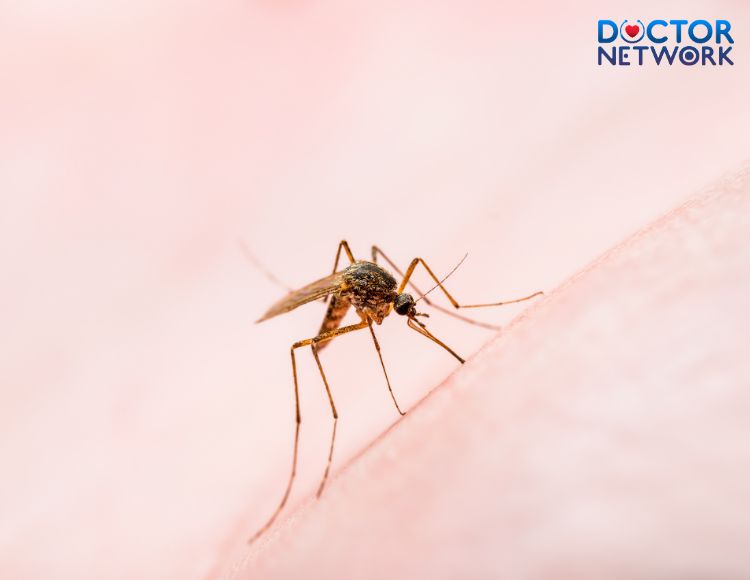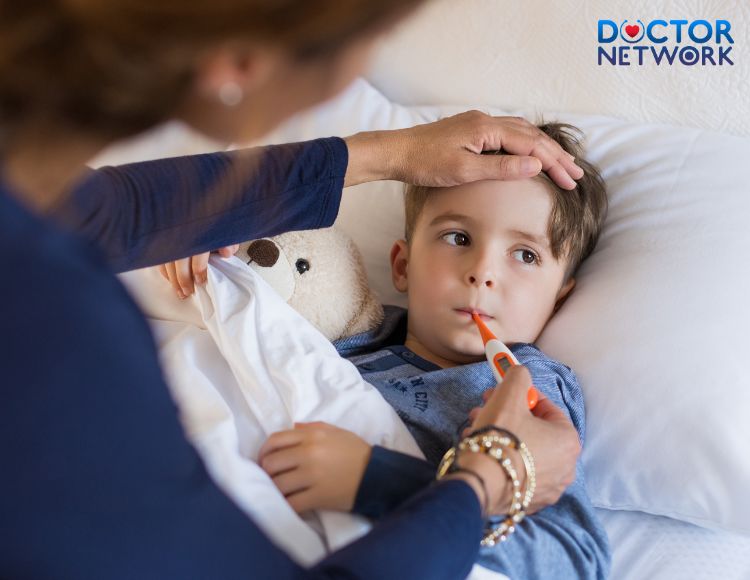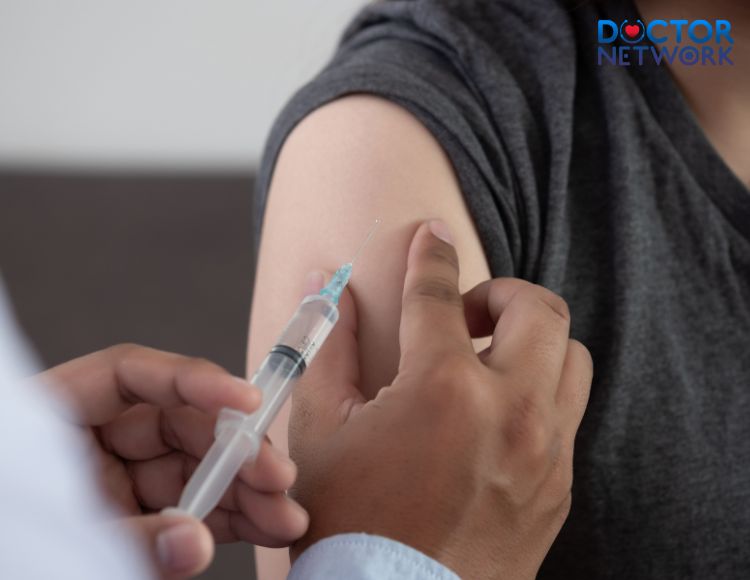Dengue fever is a dangerous infectious disease, particularly threatening to children. Understanding the incubation period of dengue fever in children helps parents recognize early symptoms, enabling timely medical intervention and reducing the risk of complications.
Incubation Period of Dengue Fever: Definition and Characteristics
The incubation period of dengue fever is the time from when the Dengue virus enters the child’s body through a mosquito bite to the appearance of the first symptoms. During this phase:
- The Dengue virus replicates within the child’s body.
- The child shows no clinical symptoms.
- The duration ranges from 4 to 7 days, and can extend up to 14 days.
Table 1: Incubation Period of Dengue Fever in Children
| Stage | Time Frame | Characteristics |
|---|---|---|
| Short | 4-7 days | Most common |
| Medium | 8-10 days | Less common |
| Long | 11-14 days | Rare |
Stage Duration Characteristics Short 4-7 days Most common Medium 8-10 days Less frequent Long 11-14 days Rare
The incubation period of dengue fever starts when a child is bitten by a Dengue virus-carrying mosquito until the initial symptoms of dengue fever appear.

The incubation period for dengue fever is from when a child is bitten by a mosquito carrying the dengue virus until the first signs of dengue fever appear
Factors Influencing the Incubation Period
The incubation period of dengue fever in children varies depending on several factors:
- Age of the child: Younger children tend to have a shorter incubation period compared to older children.
- Immunity: Children with weaker immune systems typically experience a longer incubation period.
- Dengue virus strain: Different Dengue virus strains may have varying incubation periods.
- Viral load upon infection: A higher initial viral load results in a shorter incubation period.
- Environmental factors: Climate conditions and hygiene can influence the virus’s development rate.
Symptoms of Dengue Fever in Children
Following the incubation period, children begin to exhibit symptoms of dengue fever:
- Sudden high fever (39-40°C)
- Severe headache
- Muscle, bone, joint pain
- Nausea and vomiting
- Skin rash
- Bleeding (e.g., nosebleeds, gum bleeding, petechiae)

Sudden high fever (39-40°C) is one of the symptoms of dengue fever in children
Table 2: Severity of Dengue Fever Symptoms in Children
| Severity | Symptoms | Action Required |
|---|---|---|
| Mild | Fever, headache, muscle pain | Monitor at home, drink plenty of fluids |
| Moderate | High fever, rash, nausea | Seek medical attention for evaluation |
| Severe | Bleeding, shock, difficulty breathing | Hospitalize immediately |
Severity Symptoms Action Needed Mild Fever, headache, muscle pain Monitor at home, encourage fluid intake Moderate High fever, rash, nausea Seek medical evaluation Severe Bleeding, shock, difficulty breathing Immediate hospitalization
Diagnosis and Treatment of Dengue Fever
Diagnosing dengue fever in children relies on:
- Clinical symptoms
- Blood tests (platelet count, hematocrit)
- Virological tests (NS1 antigen, IgM, IgG antibodies)
Treatment focuses on:
- Fever reduction: Paracetamol is recommended; aspirin and ibuprofen should be avoided.
- Fluid and electrolyte replacement: Encourage fluid intake and use of oral rehydration solutions.
- Rest: Limit physical activity.
- Close monitoring: Early detection of warning signs.
Prevention of Dengue Fever in Children
Prevention is the most effective strategy to protect children from dengue fever:
- Eliminate mosquito breeding sites: Cover water containers, change water in flower vases and plant pots regularly, and dispose of trash and stagnant water containers.
- Protect children from mosquito bites: Use insecticide-treated nets, mosquito repellents, and appropriate clothing.
- Boost immunity in children: Ensure a nutritious diet and appropriate physical activity.
- Vaccination: Administer dengue vaccine as recommended.
Understanding the incubation period of dengue fever in children helps parents stay vigilant and implement effective preventive measures. While complete elimination of the disease risk is not feasible, early symptom recognition and preventive actions significantly reduce the impact of dengue fever on children’s health. Always monitor your child’s health closely and seek medical advice promptly when necessary.

Vaccinate children against dengue fever (when eligible)
Frequently Asked Questions about Dengue Fever Incubation Period in Children
Here are 5 common questions related to the topic of “dengue fever incubation period in children” along with corresponding answers:
How long is the incubation period of dengue fever in children?
The incubation period of dengue fever in children typically lasts from 4 to 7 days, but it can also extend up to 14 days. During this time, the child shows no symptoms, but the Dengue virus has already entered and is multiplying in the body.
When do dengue fever symptoms appear in children?
Dengue fever symptoms in children usually appear after the incubation period ends. Typical signs include sudden high fever (39-40°C), severe headache, muscle and joint pain, nausea, vomiting, skin rash, and in severe cases, bleeding.
How can you recognize if a child has dengue fever?
Recognizing dengue fever in children relies on a combination of clinical symptoms and blood tests. If a child shows suspicious symptoms such as persistent high fever, severe headache, muscle and joint pain, parents should take the child to a healthcare facility for timely diagnosis and treatment.
Is there a way to prevent dengue fever in children?
Dengue fever in children can be prevented by actively implementing measures such as:
- Removing stagnant water containers where mosquitoes breed.
- Using insecticide-treated nets, mosquito repellents, and protective clothing.
- Administering dengue fever vaccine to children when recommended.
How should you care for a child with dengue fever?
Caring for a child with dengue fever at home should focus on:
- Reducing fever: Administering paracetamol as directed by a doctor, avoiding aspirin or ibuprofen.
- Rehydration: Ensuring the child drinks plenty of water or oral rehydration solutions to prevent dehydration.
- Rest: Allowing the child to rest in bed.
- Close monitoring: Taking the child to the hospital immediately if severe symptoms such as bleeding, shock, or difficulty breathing occur.
Understanding these aspects about the incubation period and management of dengue fever in children is crucial for parents to protect their children from this serious disease. By staying informed and proactive, parents can significantly reduce the impact of dengue fever on their child’s health and well-being.
Scientific References on Dengue Fever Incubation Period in Children
Here are some scientific references on the incubation period of dengue fever in children:
- According to the World Health Organization (WHO), the incubation period of dengue fever typically ranges from 4 to 10 days, but can extend up to 14 days. (Source: WHO Dengue Fact Sheet)
- A study published in PLOS ONE in 2012 found the average incubation period of dengue fever to be 5.8 days. (Source: PLOS ONE)
- Another study published in Clinical Infectious Diseases in 2016 suggested that the incubation period of dengue fever may be shorter in children compared to adults.
Understanding the incubation period of dengue fever in children and implementing preventive measures are crucial to protect your child from this dangerous disease. Actively educate yourself and follow preventive measures to ensure your child’s health and overall development.
Kiểm Duyệt Nội Dung
More than 10 years of marketing communications experience in the medical and health field.
Successfully deployed marketing communication activities, content development and social networking channels for hospital partners, clinics, doctors and medical professionals across the country.
More than 6 years of experience in organizing and producing leading prestigious medical programs in Vietnam, in collaboration with Ho Chi Minh City Television (HTV). Typical programs include Nhật Ký Blouse Trắng, Bác Sĩ Nói Gì, Alo Bác Sĩ Nghe, Nhật Ký Hạnh Phúc, Vui Khỏe Cùng Con, Bác Sỹ Mẹ, v.v.
Comprehensive cooperation with hundreds of hospitals and clinics, thousands of doctors and medical experts to join hands in building a medical content and service platform on the Doctor Network application.


























